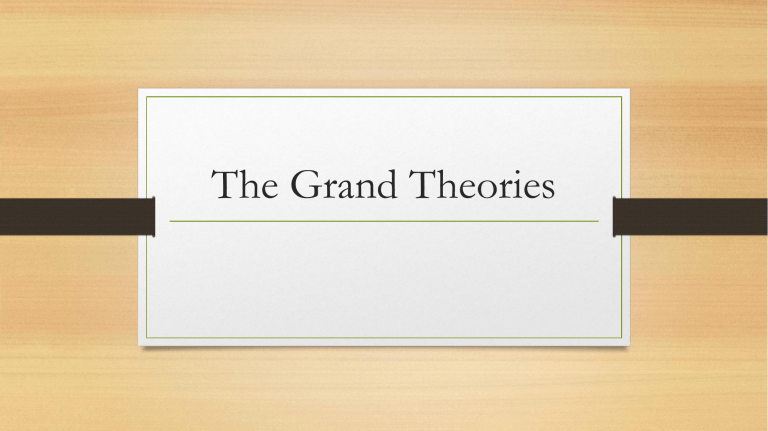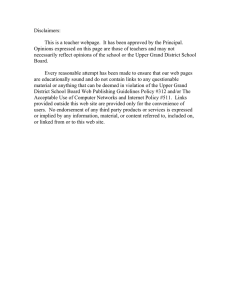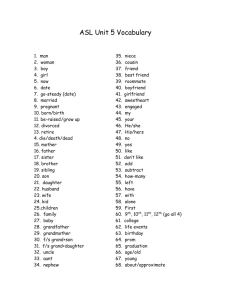
The Grand Theories Defining Grand theories Grand theories- “ all encompassing theory that seeks to explain the full range of motivated action”- The will motivate all actions. Some prominent examples would be eating, drinking, working, play compete fear, certain things, read, fall in love, and everything else.” The author provides a biblical statements that helps to make a decisive conclusion about all encompassing: “the love of money is all root of all evil is-Grand theory of evil,” the Will motivates all action- the grand theory of action Earlier Motivational theorist and their concepts Abraham MaslowAuthor of Maslow's hierarchy of needs- D Esteem needs- (Self Confidence, the absence of self doubt, recognition of achievement by peer affiliated groups) B. Safety/Security(Economic safety, Health and wellness) A: Physiological needs (food, Shelter Clothing C. Belonging or affiliation: (Impact of relationships stemming from group affiliations, family ties, peer affiliations and spousal relations F. Person Reaches Self Actualization- A whole person, who is extrovert in nature, has confidence, treasures morality and does nto prejudge Earlier Grand theorist and their work cont. Alderfer’s ERG Theory Clayton Alderfer Core needs (1) Need for Existence (2) The need to relate (3) The Growth Needs A. The need to Exist- Physiological ad safety needs; it corresponds satisfied lower order needs lead to the desire for satisfaction of higher order needs. (Example- a disgruntled employees may have a need to satify work ethic- his motivation. (come to work early) B. Similar to Maslows Hiearchy of needs because lowerd need lead to the desire for satisfaction of higher order needs Earlier Grand theorist and their work Cont. Herzberg’s Two Factor Theory HYGIENE FACTORS- EXTRINSIC MOTIVATORS JOB CONTENT – INTRINSIC MOTIVATORS-DISSATISFACTION Ability to grow within the organization Hygiene factor (external motivations-) Job content dissatisfaction • A: Polices and procedures that discourage job mobility • B. Overly supervised • C. Low salaries-high expectations. • D. Lack of empathy from administrators Empathy from supervisors and administrators Opportunity to advance professionally is a constant Recognition, Awards and Incentive are target based, non-biased and offered continuously David McClelland and John Atkinson,= Social and Esteem Motivation Heed For affiliation1 High need for affiliation with an organization B. Need for Power- 1.Their character traits display the need to solve problems, McClelland's, need theory- achievement motivation theoryhow individuals needs and environmental factors combine to form three basic human motives 2. create solutionsTheir goal is to achieve A: The need to achieve- used to describe individuals who are driven by their challenges. 1. Desire to be influential or impactful 2. The need to exert power over others 3. Seeking Positions of Leadership Seeks out jobs for that provide frequent interaction with others


